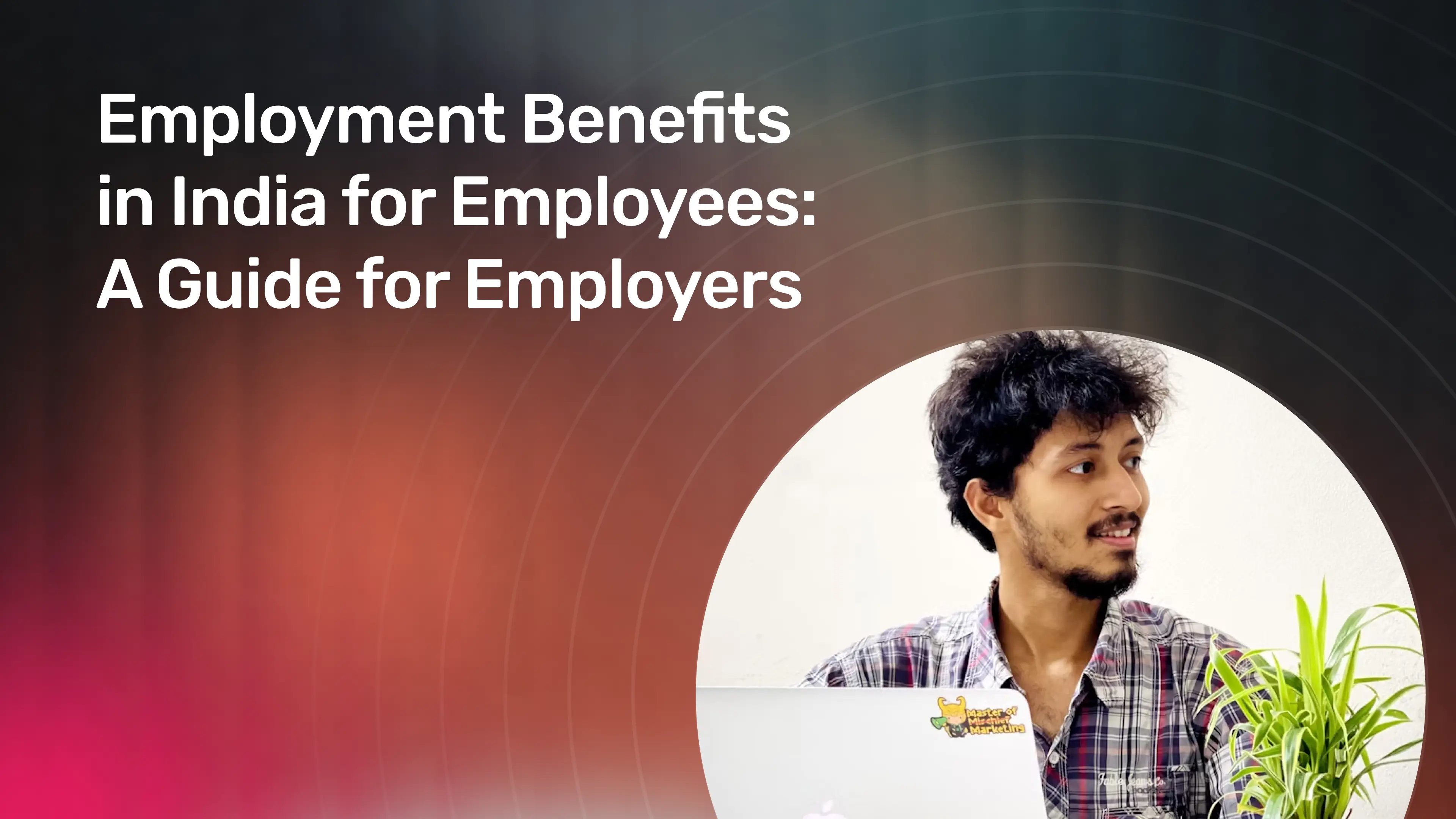Employment Benefits in India for Employees: A Guide for Employers
What makes a workplace truly attractive to employees? Is it a good salary, an amazing work culture, or an impressive designation? While all of these are undeniably important, there’s something equally impactful—the benefits a company provides. Employee benefits reflect how much an organisation truly values its people and their well-being. In India, where talent is highly competitive, the benefits you offer can be a deciding factor for many job seekers.
So providing the right employment benefits is very important for employers in India to attract and retain good employees. This guide will walk you through everything you need to know about employment benefits—from legal requirements to additional perks—to help you get it right and create a workplace your employees love.

What are employment benefits?
Employment benefits in India refer to the additional perks, advantages, or forms of support that employers provide to their employees beyond the regular salary. These benefits can range from financial support, such as bonuses and retirement plans, to non-financial benefits, like health insurance, paid leave, and training programmes.
Far from being mere "extras," these benefits are essential to ensuring employee satisfaction, motivation, and loyalty. A strong benefits package not only helps employees feel valued and secure but also increases morale and reduces staff turnover.

Types of employment benefits in India
Employment benefits in India can be broadly classified into two categories:
- Mandatory benefits: These are legally required benefits that employers must provide under Indian labour laws.
- Optional benefits: These are discretionary benefits offered by employers to enhance employee satisfaction and workplace appeal.
Both categories play an important role in creating a balanced and supportive work environment.
Mandatory employment benefits in India
The Indian government mandates certain benefits to ensure workers' rights and financial security. Below are the key mandatory employment benefits in India:
Provident Fund (PF)
The Employees' Provident Fund is a retirement savings scheme where both employers and employees contribute a fixed percentage of the employee's salary every month. This fund provides financial security to employees after retirement or in times of need, such as unemployment or medical emergencies. It is mandatory for organisations with 20 or more employees, but smaller firms can voluntarily opt in.
Gratuity
Employers must pay gratuity under the Payment of Gratuity Act, 1972, if they have 10 or more employees. Gratuity is a one-time payment given to employees who have completed at least five years of continuous service with an organisation. It’s a token of appreciation for their loyalty and long-term contribution. The maximum gratuity payable is ₹20 lakh.
Employee State Insurance (ESI)
The ESI scheme offers medical care, maternity benefits, sickness benefits, and disability support to employees earning below a certain wage threshold. Both employers and employees contribute to this scheme, which ensures financial and healthcare support during challenging times. This scheme applies to employees earning a gross salary of up to ₹21,000 per month (₹25,000 for persons with disabilities).
Leave entitlements
Indian labour laws specify various types of leave that employers must provide, including:
- Paid leave: Accumulated leave that employees can use for personal or vacation purposes.
- Sick leave: Time off granted for health-related issues.
- Maternity leave: The Maternity Benefit Act 1961 mandates 26 weeks of paid leave for women in establishments with 10 or more employees, and for a third child or more, the leave duration is reduced to 12 weeks.
- Casual leave: Short-term leave for personal reasons.
Minimum wage
Employers are required to pay at least the minimum wage set by the government. The rate varies based on factors such as the state, industry, and nature of work.
Bonus
According to the labour laws in India, under the Payment of Bonus Act, employers must provide an annual bonus to employees earning below a specified salary limit, i.e., ₹21,000 or less per month. The bonus amount is typically a percentage of the employee's salary and is paid as a reward for their contribution to the organisation's success.

Optional employment benefits in India
Another category of employee benefit in India is optional employment benefits (also known as voluntary or non-mandatory benefits), which are additional perks that employers may offer to create a more attractive and supportive work environment. While not legally required, these benefits can help attract and retain talent and significantly enhance employee satisfaction.
Health & wellness benefits
- Group health insurance: While the Employees’ State Insurance (ESI) covers low-wage workers, many companies provide group health insurance covering employees and their families, including parents. Offering group health insurance for employees and their families demonstrates that the organisation prioritises their well-being.
- Dental & vision insurance: Some employers offer additional coverage for dental and eye care.
- Mental health support: Companies increasingly provide therapy sessions, counselling services, and stress management workshops, helping employees manage
- Gym memberships & wellness programs: Employers may reimburse gym fees, provide yoga classes, or offer meditation programs, encouraging employees to focus on their physical fitness.
Financial & retirement benefits
- Employee Stock Ownership Plans (ESOPs): ESOPs are another attractive benefit that many companies nowadays provide, especially startups. These are company stock options that allow employees to benefit from company growth.
- Performance-based bonuses: Beyond fixed pay, companies can also provide annual performance bonuses, profit-sharing, or incentives depending on the employee’s work performance.
- Supplementary Provident Fund (PF) contributions: While EPF is mandatory, some companies contribute more than the required percentage.
Paid leaves & time-off policies
- Additional paid leaves: Companies may offer extra casual, sick, or annual leave beyond the legal minimum.
- Remote work: Many organisations provide flexible work arrangements, hybrid models, or full remote work, allowing employees to maintain their work-life balance.
- Paternity & parental leave: While maternity leave is legally required, paternity and adoption leave are optional benefits offered by progressive companies.
Learning & career growth benefits
- Education reimbursement: Many firms cover tuition costs for employees pursuing any certifications, or skill-based training that can help in their growth.
- In-house training & development: Some companies also invest in workshops, mentorship programmes, and leadership training to upskill their employees.
- Conference & seminar sponsorships: Employees may submit a sponsorship request letter or proposal to obtain company support for attending global summits, industry events, or networking programs.
Work-life balance & lifestyle perks
- Flexible work hours: Some companies allow employees to choose work hours instead of fixed 9-to-5 schedules.
- Free meals & snacks: Many offices offer subsidised meals, meal cards, cafeteria services, or complimentary snacks and beverages.
- Transport allowances & cab services: Employers may provide company transport, fuel allowances, or cab services, especially for late-night shifts.
- Company retreats & team outings: Annual trips, offsite team-building activities, and corporate retreats are common benefits.
Technology & equipment benefits
- Work gadgets: Employees may receive laptops, smartphones, or home-office setups.
- Internet & mobile bill reimbursements: Companies may reimburse WiFi, mobile, or co-working space expenses, especially for remote workers.
Exclusive employee discounts & perks
- Corporate discounts: Some companies partner with brands to offer discounts on electronics, apparel, food, travel, and entertainment as part of the employee benefit in India.

Also read: Indian Employment Visa: How to Apply, Requirements, and Tips
Tax implications of employment benefits in India
Providing employment benefits in India comes with certain tax advantages for both employers and employees. Here are some examples:
Tax-exempt & deductible benefits
- Provident Fund (PF), Employee State Insurance (ESI), and gratuity contributions: Employer contributions to these schemes are deductible business expenses under the Income Tax Act.
- Health insurance premiums: If an employer pays for group health insurance, including medical and accident coverage, it is not considered taxable income for employees.
- Meal cards & food coupons: Employers can offer meal cards (such as Sodexo or Zeta) with a tax-free allowance of up to ₹50 per meal, reducing taxable salary components.
- Leave Travel Allowance (LTA): LTA reimbursement is tax-exempt twice in a block of four years if employees submit valid travel proof.
- Gadgets & work equipment: Laptops, mobile phones, and internet reimbursements provided for official use are tax-free.
Taxable benefits & deductions
- Performance bonuses & ESOPs: Bonuses are fully taxable under the “Income from Salary” category, and ESOPs are taxed as perquisite at the time of exercise.
- Corporate gifts & perks: Gifts exceeding ₹5,000 annually are taxable as perquisite income.
- Car & transport allowances: If an employer provides a company car for personal use, it may be considered a taxable perquisite.
Important note: Employers should consult a tax advisor to understand the full implications and to ensure they are following the law.
Tips for choosing the right benefits
Assess employee needs and preferences
Talk to your employees to find out what benefits they value the most. Surveys or feedback sessions can help you design a benefits package that suits their needs.
Consider your budget and company culture
Think about what your company can afford and how the benefits fit with your workplace values. It’s important to offer benefits that are both meaningful and sustainable.
Stay updated on legal and regulatory changes
Keep track of changes in labour laws and government policies to make sure your benefits are always compliant.
Communicate benefits effectively
Make sure employees know about the benefits they are entitled to. Use employee handbooks, meetings, or internal platforms to share clear and simple information.
How can Native Teams help you?
Handling employee benefits in India can be tricky, especially with all the rules and paperwork. Native Teams make it easier for businesses to manage these benefits.
As your Employer of Record (EOR), Native Teams ensures that your employees receive all mandatory employment benefits while also giving you access to additional perks that enhance work satisfaction. Our services help businesses provide fully compliant employment solutions, covering everything from payroll and tax management to customised benefits packages.
Comprehensive benefits coverage: With Native Teams, you can offer a well-rounded benefits package tailored to local regulations and employee preferences, including health and insurance, financial security, work-life balance perks, and career growth opportunities.
Stress-free management: Keeping up with India’s labour laws and tax rules can be tough. Native Teams makes sure everything is legal and takes care of the hard work, so you don’t have to worry about it.
Global benefits with local support: Whether you’re hiring local talent or expanding your global team, Native Teams ensures that benefits meet the regional labour laws while also following global standards. We also offer global coverage, helping your employees access benefits in over 70 countries worldwide.
Flexible & scalable solutions: Every company is different, and so are its employees. Native Teams lets you adjust and expand benefits as needed so you can offer the best perks without overspending.

Conclusion
Employee benefits in India are not just about following the rules; they are an opportunity to create a better workplace. By offering the right mix of useful and thoughtful benefits, employers in India can support their employees and build a stronger team. Take the time to understand your employees' needs and design a benefits programme that works for everyone because a happy employee is a productive employee.
Disclaimer: This article is for informational purposes only and does not constitute legal, tax, or financial advice. Employment laws in India may change, and benefits can vary by industry and company. Employers should consult legal or HR professionals for compliance and tailored guidance.
